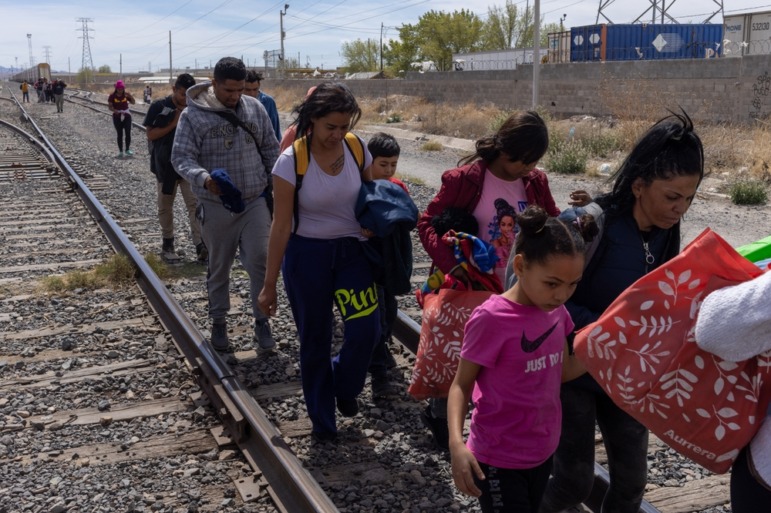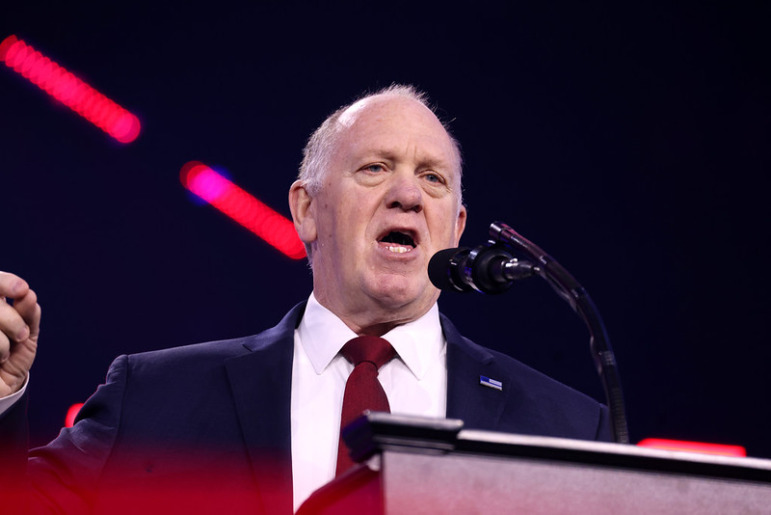![]()
The move comes as State Superintendent Ryan Walters sued two Biden administration officials Tuesday over border policies.![]()
This story originally appeared in The 74.
Four months ago, Oklahoma’s Republican state Superintendent Ryan Walters praised the Tulsa Public Schools for bucking national enrollment trends among urban districts.
The student population has not only ticked upward, but the district saw an unprecedented influx of English learners.
“It’s a huge testament to the work being done in Tulsa,” he said at a state board meeting. “I think that you’re seeing parents that have confidence in what’s being done there.”
But now he wants parents in Tulsa and other districts throughout the state to share their citizenship status when they enroll their children — a proposal that not only violates federal law but is likely to keep some parents from sending their children to school.
“It’s hurtful, and it’s going to create fear.”
Nick Migliorino, superintendent, Norman Public Schools
Districts say they don’t know how many undocumented students they have, but In Tulsa, the population of English learners grew from 10,168 in 2023 to 11,149 last year.
President-elect Donald Trump’s supporters are celebrating Walters’ effort to end “sanctuary schools,” but district leaders say the plan is traumatizing vulnerable families.
“It’s hurtful, and it’s going to create fear,” said Nick Migliorino, superintendent of the Norman Public Schools, south of Oklahoma City. “Not educating kids because of the status of their parents helps nobody.”
The Oklahoma State Department of Education says the proposed rule is needed to determine how many tutors and teachers districts need for English learners. But it comes as many national Republicans are eager to challenge a longstanding Supreme Court ruling, Plyler v. Doe, which guarantees undocumented students an education in the U.S.
“It’s reasonable to presume that this is an attack on Plyler,” said Julie Sugarman, associate director of the National Center on Immigrant Integration at the Migration Policy Institute. “If the Supreme Court was to say, ‘Well, we changed our mind — you actually can ask about immigration status,’ that would really put all of Plyler into question.”
The public has until Jan. 17 to submit comments on the rule. The state Board of Education will hold a public hearing the same day.
The plan follows an election in which President-elect Donald Trump referred to the U.S. as a “dumping ground” for undocumented immigrants. He has called for ending a ban on Immigration and Customs Enforcement raids at schools on the day he takes office and said he would deport families — even if their children were born in the U.S.
Plyler v. Doe guarantees undocumented students an education in the U.S.
Walters foreshadowed the new rule in July when he asked districts to account for the “cost and burden” of illegal immigration. And on Tuesday, he sued U.S. Secretary of Homeland Security Alejandro Mayorkas and ICE Deputy Director Peter Flores for $474 million, saying their “failed border policies” have placed “severe financial and operational strain” on Oklahoma’s schools. He sent Vice President Kamala Harris a bill for the same figure in October.
The state, which has an estimated 6,000 undocumented children under 16, will need an additional 1,065 teachers for English learners over the next five years, he wrote in his letter to Harris. He offered no specifics on where he got that figure.
“We cannot effectively budget or allocate critical resources when we have no accounting of the cost that illegal immigration places on our schools,” the letter said.
Critics say Ryan Walters courted right-wing fame as Oklahoma Ed Dept. fell apart]
State data shows that the percentage of English learners in the state, about 10%, hasn’t increased since the 2021-22 school year. But teachers in Tulsa have definitely noticed the influx of newcomers.
“Some of them just show up on Monday and they don’t speak any English,” said one teacher in the district who did not want to be named in order to protect students. She often communicates with students through bilingual staff members. “I just hear the saddest stories every day. The kids are really sweet, but they’re afraid.”
She worries about what might happen if recent immigrants are unable to attend school.
“We provide coats,” she said. “We provide groceries on the weekends.”

David Peinado Romero/Shutterstock
Migrants head for the U.S. in Ciudad-Juárez, Chihuahua, Mexico (just south of El Paso, Texas). President-elect Donald Trump plans to carry out mass deportations, but the Biden administration recently extended temporary protected status for nearly 1 million undocumented immigrants.
‘Will not comply’
Norman, where about 8% of students are English learners, was among the many districts that didn’t submit any data to the state last summer. Regardless of their needs, Migliorino said, “educators invest in the students who show up in our district.”
Leaders of other districts, including the Santa Fe South charter schools, Bixby Public Schools and the Millwood school system, pushed back on Walters’ demands, saying they haven’t asked about families’ immigration status and don’t intend to start.
Bixby Superintendent Rob Miller told The 74 the proposed rule was “clearly unconstitutional.”
“Bixby will not comply,” said Miller, an outspoken critic of Walters who is suing him for defamation.
He compared Walters’ plan to the state’s legal battle over a first-in-the-nation religious charter school. While the Oklahoma Supreme Court said the Catholic charter violates the law, the school and the state’s charter board have appealed that ruling to the U.S. Supreme Court. The court has not yet decided whether to hear the case.
“I believe they are trying to create a case for the Trump Supreme Court,” he said.
[Related: Oklahoma Supreme Court strikes down Catholic charter school]
Oklahoma isn’t the first state to attempt to curb illegal immigration’s impact on schools. In 1994, California voters passed Proposition 187, which denied undocumented immigrants access to public education and other services. The measure directed teachers to report students they suspected were undocumented to authorities. But advocates and federal courts found it unconstitutional.
Since then, Alabama, Arizona, Maryland and Texas have sought to ask parents about their citizenship, all for the stated purpose of determining how much it costs to serve unauthorized students. Only Alabama’s law was enacted, but a federal appeals court struck it down in 2012, after only a year.
The issue could prove appealing for the Supreme Court, which took a sharp right turn during President-elect Donald Trump’s first term. That ideological shift resulted in the end of federal abortion rights and the reversal of an opinion that gave federal agencies significant leeway to interpret the law.
“We have a different court now,” said Sugarman of the Migration Policy Institute. “The court’s willingness to overturn legal precedent means that lots of things are on the table that we wouldn’t previously [have] thought were in play.”

Gage Skidmore/Flickr
Tom Homan — incoming border “czar” — spoke to the right-wing group Turning Point USA during their December event at the Phoenix Convention Center in Phoenix, Arizona.
Attorney general agreement
The education department has until March to submit the rule to the legislature, where both the House and Senate must approve the measure for it to pass. If they don’t take action, the package automatically goes to the governor to sign.
Walters, who frequently clashes with Oklahoma Attorney General Gentner Drummond on issues like religion in public schools and education funding, has found common cause with his frequent opponent on the issue of seeking parents’ citizenship status.
“The Attorney General has said he believes Oklahoma has the right to collect citizenship data in connection with government services,” said spokesman Phil Bacharach.
In a recent interview, Drummond, who announced his run for governor Monday, spoke about efforts to cooperate with the incoming Trump administration to deport undocumented immigrants who are committing crimes in the state. But he didn’t address education.
[Related: Potential for immigration arrests at schools under Trump spurs push to shield families]
As “protected areas or sensitive locations,” schools have been off limits for ICE agents at least since 2011. Ignacia Rodriguez Kmec, an attorney with the National Immigration Law Center, said she wasn’t aware of any past ICE raids at U.S. schools. But research shows that enrollment of Hispanic students in school drops, especially in the elementary grades, when ICE and local law enforcement partner to enforce immigration laws. Following a raid at a Tennessee meatpacking plant in 2019, hundreds of students in the local district were absent.
For now, some districts have tried to reassure parents who might be hesitant to enroll their children or send them to school. Oklahoma City Superintendent Jamie Polk issued a statement saying the district’s schools “are a safe and welcoming place for all students, and our mission remains unchanged.”
Superintendent Ebony Johnson has tried to put families at ease, saying that rulemaking is a long, drawn-out process.
“There is a place for you and your children here,” Johnson said in a video message. “We want students here at school every day.”
***
Linda Jacobson is a California-based senior writer for The 74, covering Congress, policy, courts, early education and more. Prior to The 74, she spent three years reporting for the Education Dive, and also wrote a monthly column on research, policy and practices related to young children. Previously, Jacobson covered schools for the Atlanta Journal-Constitution, worked as a reporter and associate editor at Education Week, and served as assistant director of the Education Writers Association.
The 74 is a nonprofit news organization covering America’s education system from early childhood through college and career. The 74 is dedicated to examining the issues impacting the education of America’s 74 million children — and the effectiveness of the system that delivers it. The 74 centers their reporting on the teachers, innovators, researchers, school leaders and politicians who shape that education, sometimes for the better, sometimes for the worse. Their mission is to lead an honest, fact-based conversation about how to give American students the skills, support and social mobility they deserve. Backed by data, investigation, and expertise. Sign up for free newsletters from The 74.


























